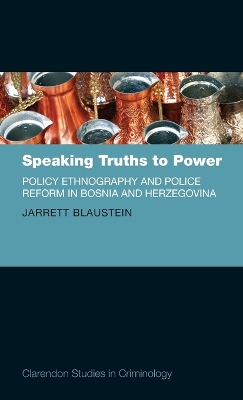Clarendon Studies in Criminology
1 total work
Speaking Truths to Power: Policy Ethnography and Police Reform in Bosnia and Herzegovina presents a rigorous analysis of the effects of globalisation on local policing, drawing on data generated from two ethnographic case studies conduscted in 2011 in Bosnia and Herzegovina. By examining structures, mentalities, and practices, it situates the phenomenon of 'glocal policing' in relation to the convergence of development and security discourses, and raises important questions about the purpose and value of criminological engagements with transnational policing fields.
The idea of 'speaking truths to power' (as opposed to a single 'truth') is illustrated by the author's fieldwork, covering active police capacity building projects implemented by international development agencies. Both studies illustrate that global power inequalities affect police reform projects, but also that nodal opportunities exist for seemingly disempowered stakeholders, specifically international development workers and rank-and-file police officers to mediate their effects. This mediatory role is analysed through the conceptual lens of 'policy translation', providing an innovative framework for interpreting how policy meaning and content are altered as a result of their transmission between contexts.
Through detailed and persuasive investigation, Speaking Truths to Power argues that it is time for criminologists to look beyond the established structural critiques of transnational policing power in order to ensure that this growing body of research reflects the diverse interests, experiences, and understandings of the agents and institutions who collectively populate these fields of policy and practice. Conceptually sophisticated and thematically ambitious, the book will be of interest to scholars in the fields of criminology, sociaology, international relations and socio-legal studies as well as those who are researching and studying transnational policing, police reform, and the global governance of crime.
The idea of 'speaking truths to power' (as opposed to a single 'truth') is illustrated by the author's fieldwork, covering active police capacity building projects implemented by international development agencies. Both studies illustrate that global power inequalities affect police reform projects, but also that nodal opportunities exist for seemingly disempowered stakeholders, specifically international development workers and rank-and-file police officers to mediate their effects. This mediatory role is analysed through the conceptual lens of 'policy translation', providing an innovative framework for interpreting how policy meaning and content are altered as a result of their transmission between contexts.
Through detailed and persuasive investigation, Speaking Truths to Power argues that it is time for criminologists to look beyond the established structural critiques of transnational policing power in order to ensure that this growing body of research reflects the diverse interests, experiences, and understandings of the agents and institutions who collectively populate these fields of policy and practice. Conceptually sophisticated and thematically ambitious, the book will be of interest to scholars in the fields of criminology, sociaology, international relations and socio-legal studies as well as those who are researching and studying transnational policing, police reform, and the global governance of crime.
